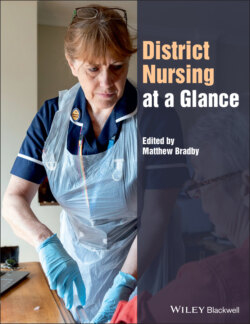Читать книгу District Nursing at a Glance - Matthew Bradby - Страница 19
Оглавление7 The role of the district nurse: autonomous practice
Matthew Peasey, QN
Figure 7.1 A district nurse carrying equipment from a patient’s home.
Figure 7.2 The novice to expert continuum.
Figure 7.3 A district nurse on her rounds.
The title ‘district nurse’ is widely and often incorrectly used by nursing colleagues, even by nurses working within community/district nursing services themselves. In turn this has meant that patient understanding and respect of the district nurse role and level of responsibility has been eroded. However, district nurses and their community nursing colleagues remain an integral part of the community healthcare system, bringing healthcare closer to home and preventing unnecessary hospital admissions. The NHS England Long Term Plan (https://www.longtermplan.nhs.uk/) has reinforced how important district nurses will be to delivering healthcare closer to and within people’s homes and communities (Figure 7.1).
Novice to expert
Traditionally, district nursing was an essential but somewhat isolated role in villages, towns and cities. These nurses unassumingly and diligently visited patients in their own homes, caring for families they often knew very well. They sought to maintain patients’ ability to stay at home or to rehabilitate them, in the hope that nursing care would eventually no longer be needed. They achieved this by minimising the risk of harm, using their intuition and learned skills from experience with previous patients to constantly move care forward. Essentially, they became the leaders in supportive care and self‐management (Figure 7.2).
Today, experienced district nurses who have undertaken the combined theory and practice programme run by universities in the UK will have developed and built on their existing knowledge and skills to become safe, autonomous and competent specialist practitioners. They initiate, lead and deliver contemporary district nursing practice with the assistance of a team that includes healthcare assistants and other practitioners.
Autonomous practice
The thought of a nurse becoming autonomous may be a challenging concept for some clinicians to get to grips with. However, you could argue that the concept of autonomous practice is basically a re‐invention of the novice‐to‐expert continuum (Figure 7.3): district nurses have always assumed an autonomous role without acknowledging it. They have always worked independently of their medical colleagues, only asking for guidance once their own skill set is exhausted. They have been creative in finding solutions for patients’ and carers’ challenges and inspired them to move away from being largely dependent on the nurse, through a stage of being partially dependent until ultimately becoming independent. This is essentially autonomous practice, in that the nurse is steering care and taking responsibility for his or her own actions without constantly needing reassurance or guidance. These nurses have become expert decision‐makers and are confident in their own abilities and conduct.
District nurses have blurred the lines of what was traditionally thought of as nursing practice. While maintaining their nursing mind‐set, they have developed and moved closer to the practice of their medical colleagues. In today’s practice, a district nurse is expected to have a broad perspective, sound decision‐making ability and a strong foundation in nursing practice, and to be an expert team leader. They achieve this today in different ways to those of the past, but still they prove their ability and commitment to patient care.
Physical examination and prescribing
District nurses need to be skilled in undertaking physical examination and consultation structuring. By doing so they are able to gain the information they need to motivationally interview their patients and make sound decisions about their care. Increasingly, patients are looking to their district nurse for planned, personalised and holistic care of their health, knowing that they have the skills and knowledge to provide that care at home.
Nurses who complete the Nursing and Midwifery Council (NMC) Community Practitioner Nurse Prescribing course (v100 or v150) may prescribe from the Nurse Prescribers’ Formulary for Community Practitioners. This includes appliances, dressings and some medicines. Those who have completed an Independent Nurse Prescribing Course (v200 or v300) are able to prescribe any medicine, provided it is within their competency. Those who have completed the supplementary part of the course are also able to prescribe against a clinical management plan. Hence, district nurses are assuming many of the roles that would traditionally have been within the GP’s core domain. In the community, district nurses have been the guiding light in advancing autonomous practice and this trend has transferred into the hospital setting. Medical colleagues have come to trust the district nurse’s decision‐making ability and community teams are inspired to provide excellent, holistic patient care.
Summary
Moving towards autonomous practice is a continuous process. By embracing the concept of life‐long learning you become safe; do not be afraid to use your intuition.
You must be able to develop confidence in working alone, as well as leading a team and be prepared to make tricky decisions.
Seek further education in advanced physical examination skills and prescribing; consult with patients and negotiate on plans of care so they may make informed choices.
Instigate evidence‐based practice through motivational interviewing.
Know your boundaries and limitations; do not be scared to ask for help or guidance as this will make you more credible and build your confidence.
Inspire your colleagues, seek to influence the decision‐making process and advocate for your patients’ interests.
Refer to Chapter 18 about lone working for more information about staying safe, acknowledging risk and team working.
Working in the community may not be for you if you feel vulnerable working alone or dislike driving.
Do not follow trends, policies and procedures blindly or deliver task‐focused care.
Remember your roots in nursing and do not be afraid to deliver basic nursing when required.
Do not be afraid to challenge.
